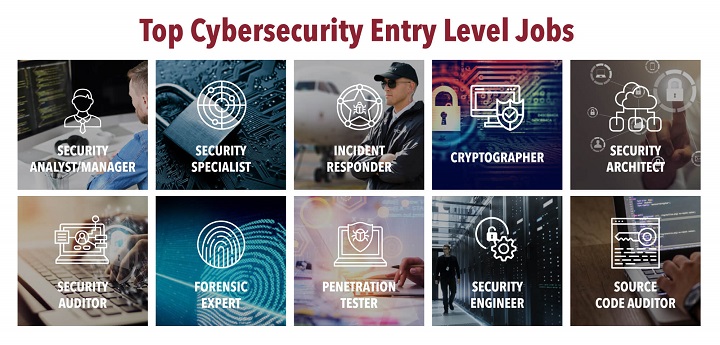Why Choose a Career in Cyber Security?

Cyber security is a critical component of modern IT infrastructure. With the increasing reliance on digital technology, the protection of sensitive data and systems from cyber threats has become paramount.
Key Reasons to Choose Cyber Security
- High Demand: The cyber security field is experiencing a shortage of qualified professionals, leading to abundant job opportunities.
- Competitive Salaries: Cyber security jobs often offer higher-than-average salaries, even at entry-level positions.
- Job Stability: As cyber threats evolve, the need for cyber security professionals remains constant, providing job security.
- Career Growth: Numerous opportunities for specialization and advancement within the field.
- Impactful Work: Protecting organizations and individuals from cyber threats is a rewarding and impactful career choice.
Understanding Entry Level Cyber Security Jobs
What are Entry Level Cyber Security Jobs?
Entry-level cyber security jobs are positions that require basic knowledge and skills in cyber security. These roles are designed for individuals who are just starting their careers and typically do not require extensive experience. They provide a foundation for learning and growth within the field.
Common Entry Level Cyber Security Job Titles
- Cyber Security Analyst
- Security Operations Center (SOC) Analyst
- Information Security Analyst
- Network Security Associate
- Incident Responder
- IT Security Specialist
- Vulnerability Analyst
- Security Technician
Essential Skills for Entry Level Cyber Security Jobs
Technical Skills
To succeed in entry-level cyber security roles, certain technical skills are essential. These include:
- Networking Basics: Understanding how networks operate, including TCP/IP, DNS, and common network protocols.
- Operating Systems: Proficiency in both Windows and Linux operating systems.
- Programming Languages: Basic knowledge of programming languages like Python, Java, or C++ can be advantageous.
- Security Tools: Familiarity with security tools such as firewalls, intrusion detection systems (IDS), and antivirus software.
- Encryption: Understanding the basics of encryption and how it is used to protect data.
Soft Skills
In addition to technical skills, soft skills are equally important in the cyber security field:
- Problem-Solving: Ability to think critically and solve complex problems.
- Attention to Detail: Precision and accuracy in identifying potential security issues.
- Communication: Clear and effective communication skills, both written and verbal.
- Teamwork: Ability to work collaboratively with other IT professionals and departments.
- Continuous Learning: Willingness to stay updated with the latest cyber security trends and technologies.
Educational Pathways to Entry Level Cyber Security Jobs

Degrees and Certifications
Bachelor’s Degree
- Computer Science: A common degree that provides a broad understanding of computer systems and programming.
- Information Technology (IT): Focuses on the practical application of technology in business environments.
- Cyber Security: Specialized programs that provide in-depth knowledge of cyber security principles and practices.
Certifications
Certifications can enhance your qualifications and demonstrate your commitment to the field. Some valuable entry-level certifications include:
- CompTIA Security+: Covers foundational principles of network security and risk management.
- Certified Ethical Hacker (CEH): Teaches the skills required to identify and exploit system vulnerabilities.
- Cisco Certified CyberOps Associate: Focuses on security operations and monitoring.
Online Courses and Bootcamps
For those who prefer a non-traditional educational route, online courses and bootcamps offer flexible and intensive learning options:
- Coursera: Offers courses from top universities in cyber security.
- Udemy: Provides a variety of cyber security courses for different skill levels.
- Cyber Bootcamps: Intensive programs designed to provide practical skills in a short period.
Gaining Experience: Internships and Entry-Level Positions
Internships
Internships are a great way to gain practical experience and make industry connections. They often lead to full-time job offers. Look for internships in:
- IT Departments: Many companies offer IT internships that include security-related tasks.
- Cyber Security Firms: Specialized firms may offer internships focusing solely on security.
Entry-Level Positions
Starting in an entry-level position is a common path to gaining experience. Some strategies include:
- Apply for Junior Roles: Look for job listings that specify they are open to candidates with little or no experience.
- Network: Use professional networks and platforms like LinkedIn to connect with industry professionals.
- Leverage Education: Highlight relevant coursework and projects in your resume and cover letter.
Navigating the Job Market: How to Find Entry Level Cyber Security Jobs
Job Boards and Websites
- LinkedIn: A valuable resource for networking and job listings.
- Indeed: A comprehensive job board with a wide range of listings.
- Glassdoor: Provides company reviews and salary information.
- CyberSecJobs: A job board specifically for cyber security positions.
Networking and Professional Associations
- Join Professional Organizations: Associations like (ISC)², ISACA, and CompTIA offer networking opportunities and resources.
- Attend Conferences and Meetups: Events like DEF CON, Black Hat, and local security meetups can help you connect with industry professionals.
- Online Communities: Participate in forums and groups on platforms like Reddit and Discord.
Tailoring Your Resume and Cover Letter
Your resume and cover letter are critical in making a strong first impression. Tips include:
- Highlight Relevant Skills: Focus on skills and experiences that match the job description.
- Use Keywords: Incorporate keywords from the job listing to pass through applicant tracking systems (ATS).
- Showcase Certifications: List any relevant certifications prominently.
- Quantify Achievements: Use numbers to quantify your accomplishments, such as “Improved network security, reducing incidents by 30%.”
Preparing for Interviews
Common Interview Questions
- Technical Questions: Be prepared to answer questions about networking, security tools, and programming.
- Behavioral Questions: Interviewers may ask about your problem-solving abilities, teamwork, and how you handle stress.
- Scenario-Based Questions: Expect questions that present a security scenario and ask how you would respond.
Tips for Success
- Practice: Conduct mock interviews to build confidence.
- Research the Company: Understand the company’s business and security challenges.
- Prepare Questions: Have thoughtful questions ready to ask the interviewer about the role and the company.
Advancing Your Career in Cyber Security
Continuing Education and Certifications
To advance in your career, consider pursuing additional certifications and education:
- Certified Information Systems Security Professional (CISSP): Advanced certification for experienced professionals.
- Certified Information Security Manager (CISM): Focuses on managing and governing an enterprise’s information security program.
- Master’s Degree: A master’s in cyber security or a related field can open up more advanced positions.
Specializing in a Niche Area
Specializing in a specific area of cyber security can enhance your expertise and career prospects. Some niche areas include:
- Penetration Testing: Conducting authorized tests on systems to identify vulnerabilities.
- Digital Forensics: Investigating cyber crimes and recovering data.
- Threat Intelligence: Analyzing data to predict and mitigate potential cyber threats.
Seeking Leadership Roles
As you gain experience, consider moving into leadership roles such as:
- Security Manager: Overseeing an organization’s security policies and procedures.
- Chief Information Security Officer (CISO): Responsible for the overall security strategy and implementation.
Conclusion
Starting a career in cyber security is a smart choice in today’s digital age. With high demand, competitive salaries, and numerous opportunities for growth, entry-level cyber security jobs provide a solid foundation for a rewarding and impactful career. By acquiring the right skills, gaining practical experience, and continuously learning, you can successfully navigate the path to becoming a cyber security professional.
Additional Resources
Books
- “The Web Application Hacker’s Handbook” by Dafydd Stuttard and Marcus Pinto: A comprehensive guide to web application security.
- “Metasploit: The Penetration Tester’s Guide” by David Kennedy, Jim O’Gorman, Devon Kearns, and Mati Aharoni: A detailed guide to using Metasploit for penetration testing.
Websites
- Kali Linux: A popular platform for penetration testing and security research.
- OWASP: Provides resources for web application security.
Online Communities
- Reddit (r/cybersecurity): A community for discussing all things related to cyber security.
- Stack Exchange (Information Security): A Q&A site for information security professionals.
By following this guide, you can take the first steps towards a successful and fulfilling career in cyber security. Remember, the journey is continuous, and staying updated with the latest trends and technologies is key to thriving in this ever-evolving field.


